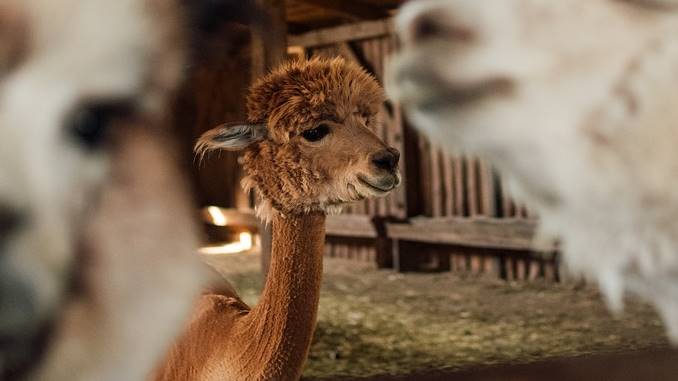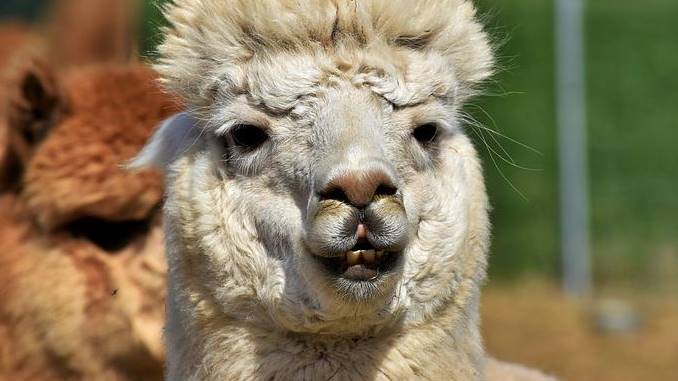Disclaimer: The information presented below is for general informational & educational purposes only. Always consult with animal professionals in case of specific concerns.
Alpacas are a species of camel native to South America.
They look a lot like llamas, but they are smaller. Like camels, this species has a gentle appearance.
In the natural world, there is no shortage of animals with aggressive personalities, despite their gentle appearance. So, are alpacas dangerous?
Let’s find the answer to this question through the following article!
Are Alpacas Dangerous?

No, alpacas are generally safe and not dangerous to humans.
These animals are gentle, small, agile, and gentle creatures.
Alpacas don’t have any “weapons” that other dangerous wildlife often has.
This animal has no teeth, sharp horns, hooves, or claws. These alpacas are not known to attack gratuitously or randomly.
In addition, this species makes good protection for smaller animals like rodents and poultry. The most severe reactions of this animal may include spitting, an unpleasant kick, or jumping away.
If you take care of them when they are young, they will become friendly and docile when they grow up. This animal may even allow you to touch its nose.
Can Alpacas Be Aggressive?
These animals are very calm and docile. Yet, that does not mean they cannot become aggressive; they can become irritable and fight for many reasons.
Breeding Rights
Males may compete with each other for breeding rights over females. To avoid this problem, you need to separate the males from the females.
Just make sure the males don’t see the girls, and you’ll be fine.
Fight for Food, Water, and Space
If these animals realize that food is in short supply, they will fight for rights with each other.
For example, a large individual in the herd may sit near the water source to prevent other members from approaching if it perceives an insufficient water source.
The only way to solve this problem is to provide them with enough water and food. On the other hand, the alpaca prefers large spaces and can fight with each other for territory.
Therefore, keeping them in a confined space can cause them to become irritable, leading to fights.
When These Animals Are Frightened
Despite their docile appearance, the animals react strongly when sensing a threat.
They usually attack by kicking with their hind legs. Therefore, we recommend approaching these animals calmly and gently, avoiding panicking them.
Normal Behavior And Aggressive Behavior
These animals are safe and docile, but they will defend themselves when they (or their offspring) are threatened.
We will first discuss the normal behavior of this animal.
Normal Behavior
- Lean, Rub, or Inspect Things Using Their Nose
This behavior is normal as it is how an alpaca greets another individual (usually other members of their herd). This behavior is not recommended for humans.
- Biting
These animals can pretend to bite while they are playing with each other. Yet, they likely bite against predators or when competing in breeding competitions.
They are very rare other than spitting humans. Their saliva can be slightly acidic. Do not worry! You just need to wash it off.
- Spitting
It is the first and most common defense response for some species of the alpaca.
These animals can spit up to ten feet. In addition, the alpaca’s saliva may contain stomach acid or vomit.
- Kicking
This species can kick other members of the pack when fighting. It can also kick predators near them.
In some cases, this species can even kick its kind owners, although very rarely. These kicks do not seriously injure you but are enough to bring about unpleasant experiences, even causing a few bruises.
- Rearing, Chest bumping, and Charging
This normal behavior is often seen in battles between alpacas to show dominance. It is also not a recommended practice for humans.
- Dominant Stances
Alpacas often use dominant stances towards other ones. It can be a great teaching tool for their unruly cries.
Also, it may be a natural response if resources are limited.
Aggressive Behavior
These animals can become aggressive and have varying degrees of aggression. Each level is entirely different and will require different reactions.
- Leaning, Rubbing, or Sticking Its Nose in Your Space
An aggressive one will cross one of the first lines, typically as a cria.
- Spitting
You need to find out why the animal is spitting and find a way to address any underlying issues.
- Biting While Play Fighting Other Member
It’s not unusual for alpacas to play combat with other members. So, it is essential to trim the teeth and toenails of these individuals to minimize the risk of injury.
- Kicking without Reasons
Kicking is a defensive behavior of these animals when the predator is too close to them. But they should not be trigger-happy kickers.
The fact is that an alpaca kicks too much can signify that you need to retrain it.
- Charging other Alpaca
Charging other alpacas can also be a normal behavior when competing over breeding rights or resources are scarce.
So, it is necessary to separate the alpacas or increase access to the resource in this case.
- Rearing & Chest Butting
This behavior is only normal when an alpaca fights for breeding rights or plays combat.
If this animal does this to you, it probably thinks you’re part of the pack. It is a problem to be solved.
- Physically Menacing
Abnormal behavior often indicates too much human interaction.
Read more: Are Sloths Dangerous to Humans & Pets?
Do Alpacas Attack Humans?
An alpaca can attack humans, but this is extremely rare and does not lead to severe consequences.
Even if this animal attacks you, it will deal negligible damage. As a result, you can consider this animal to be harmless.
In addition, biting can also be attention-seeking behavior rather than aggressive behavior for an alpaca. This animal will not cause much harm.
These gentle animals do not have any of the “weapons” that other animals typically have, such as horns, claws, and hooves.
Training these animals from an early age can make them easier to socialize and prevent them from becoming aggressive.
Alpacas can be good pets, and it will be easier to take care of calmer and more docile individuals.
Do The Alpaca Bite?
Yes, these animals can bite because of their sharp fighting teeth, which they use to defend or compete for breeding rights. Yet, alpacas do not bite humans.
If this happens, it will reflect how they are being raised. Maybe you are treating and feeding these animals inappropriately, and you need to change.
On the other hand, it is normal for an alpaca to bite other alpacas in the herd. Therefore, if you want to minimize bite damage, it is essential to trim their fighting teeth.
Male alpacas may bite each other when fighting for breeding rights or dominance. Male and female alpacas can also bite each other when competing for food and water.
In addition, these animals may also attack and bite other animals when they feel threatened and harassed.
How to Prevent Dangerous Behavior in The Alpaca?
The best way to prevent this dangerous animal is to prevent it in the first place. Here are some essential steps you need to take.
- Do not encourage them with poor behavior: While it may seem cute at first, it can become a more significant issue since your crush becomes an aggressive, unruly adult.
- Take advantage of the herd mentality: We recommend keeping an alpaca with others. As a result, they can socialize with each other appropriately.
- Design alpaca’s areas appropriately: As a result, you will encourage these animals to become safer and docile.
- Be proactive in teaching good manners to your alpacas: Your alpaca herd will typically do it for you.
The fact is that the cause of these animals becoming aggressive is almost always human. There are very few aggressive individuals in the wild.
Once you detect aggressive behavior, it is essential to evaluate your current setup and your alpacas’ herd. Then, you need to do all you can to limit fighting.
Re-training Dangerous Alpacas
If an individual in your herd shows signs of becoming aggressive, it is essential to recondition it before it gets worse.
Fortunately, this species is quite intelligent, and you will easily retrain them when necessary.
The best treatment for an aggressive individual is the ones left in the herd. Specifically, when aggressive alpacas are overwhelmed by others in the herd, they will have to limit their aggressive behavior.
They will be kicked out of the herd, leading to losing habitat and food sources. As a result, aggressive individuals will quickly correct their behavior to be integrated into the herd.
Therefore, it is wise to keep more than two alpacas. The other two will moderate the aggressive individual when one individual exhibits aggression.
Sex problems can also be the cause of aggression. A male cria being raised by a female herd may turn unruly if they are not set in their place enough.
In this case, you can speak to other owners and request if you can send your animal temporarily to another herd to make them straight.
You can also try other methods, such as simulating spitting using a squirt gun.
Why Do These Animals Spit?

You will occasionally see these animals spit, and they can spit up to 10 feet away. So why do they do that?
Fighting for Food and Water
These animals may spit when competing for food. So, if you do not provide them with enough food or water, they will compete with each other by spitting.
Self-Defense When Threatened
In addition to competing for food, when threatened or harassed, these animals may spit as a form of self-defense.
The saliva of these animals is contained in the stomach and is grayish-green and rough. Although their saliva is not toxic, it has a very unpleasant odor.
When Pregnant
Alpacas can also spit on males while they are pregnant. Therefore, it is one of the signs to know if your alpacas are pregnant.
Not Well Trained
Rebellious alpacas can spit on their owners if not trained well. In this case, it is essential to discipline such individuals to stop this behavior in time.
FAQ’s
Do Alpacas Fight Each Other?
Yes. These animals fight for breeding rights and food & water. You can reduce fights by increasing access to resources and separating females and males.
Do Alpacas Like to Be Hugged?
No, these animals don’t like to be petted.
We recommend avoiding touching or hugging alpacas like other pets because you will make them feel scared and threatened, causing them to attack you.
How Many Alpacas Should I get?
It will be better to keep a herd consisting of at least three or more alpacas.
Can I Run Alpacas With Other Livestock?
Alpacas are gentle animals and can get along well with other animals. Naturally, it is unwise to combine alpacas and large and aggressive dogs.
The Bottom Line
Alpacas are generally gentle, calm, and not dangerous. But they can be aggressive when they feel threatened, or you are not training them properly.
These animals may also exhibit unusual behaviors when competing for food and water because resources are scarce or competing for breeding rights.
Males have fighting teeth, allowing them to bite each other in battle, while females often spit during pregnancy.

Hi, my name is John, and I’m an animal lover. I’ve been fascinated with the animal kingdom since I was 5 years old, and my passion keeps growing bigger as I age. And this blog is where I share my researches and passion with animal lovers all around the world.
